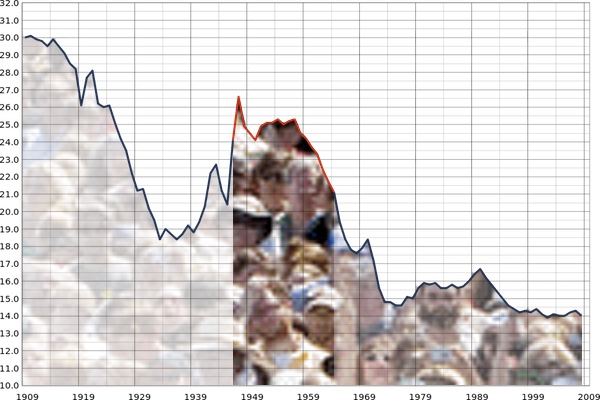2016 is the Last Hurrah of the Baby Boom and World War II Generations

United States birth rate (births per 1000 population). The red segment from 1946 to 1964 is the postwar baby boom, with birth rates starting to drop around 1960.
In this highly unusual Presidential campaign, with Donald Trump, Hillary Clinton and Bernie Sanders in the lead, much ado has been made over their often-unorthodox political styles and hyperbole.
But, there is one key element that is often mentioned and then forgotten. That is their age and the environment in which they grew up.
Unlike the two 44-year-old Gen X candidates Rubio and Cruz, the older candidates are part of a World War II and Baby Boomer generation that will soon be passing from the political scene. They are narrowly bunched in age, with Clinton and Trump in their late 60s and Sanders 74 years old. Even the trailing Carson and Kasich are within one or two years of the traditional retirement age of 65. If 74-year-old Michael Bloomberg, as often mooted, chooses to run, he will fit well into this group, too.
These candidates were all born in the 1940s and early 1950s. The post-war era of their youth was one of great optimism and enthusiasm following the American victory in World War II, an undamaged home front, and an end of the Great Depression of the 1930s. This period saw the emergence of the United States as the leading global superpower, the demise of former great powers France, England, Germany and Japan and the creation of new institutions placed appropriately in Washington (International Monetary Fund and World Bank) and New York (United Nations). At home, Americans saw the beginning of the end of racial segregation, a massive move to the suburbs, an economic boom, the launch of a space program and the reassuring leadership of President Eisenhower as epitomized by the ever-present “I Like Ike” buttons.
Only the development of the Cold War with the Soviet Union marred this picture. But, this bipolar struggle soon led to over four decades of strong bipartisan support for American foreign policy both in Congress and among most Americans.
The words of Clinton and Bloomberg, as well as those of Kasich and Carson, are the language of centrist Democrats and Republicans, who grew up with a strong belief in American power and exceptionalism. They developed a love for this country, a belief in an expanding capitalist economy and a certainty that all problems could be solved. Later in their lives, the victory in the Cold War and their own highly successful careers reinforced these ideas.
Even the words of Trump and Sanders, however overblown they may often seem, are filled with optimism. For Trump, everything boils down to a deal that resolves any given problem. As for Sanders, all problems are solvable if only we adopt his peculiarly American-style “socialism.”
Overall, this is the grandparents’ generation making its last fling at the Presidency. They have much to gain and little to lose. Even if they are defeated, they will have made their mark on history and may get appointments by the new President. But, their time is limited and fading away. For in another four or certainly eight years, they will be replaced by the Gen X’ers and then the millennials.
By contrast, Gen X’ers Rubio and Cruz were raised in a very different America than that of the older generation. They grew up in the 1990s when victory in the Cold War had been won and everything looked rosy. But, as they reached their 30s, the economy went into the worst recession since the Great Depression of the 1930s. It was succeeded by a weak recovery that continues even today eight years later. More recently they see the once “almighty” United States semi-withdrawing from the Middle East, the rise of authoritarian and hostile China, Russia and Iran, and massive violence in significant parts of the Third World.
These more recent developments have driven Rubio and Cruz, as well as substantial numbers of younger people in both parties, to demand a radical change in the economy and to make America great again.
The passing of the torch is invariably difficult under the best of conditions. But profound domestic and international changes have created a climate in which the older political generation can yet flourish until the time is ripe for the next generation to take the stage.